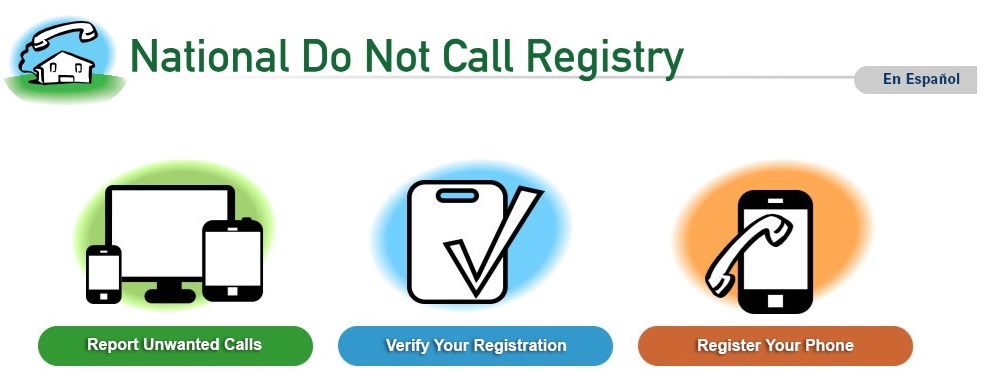As a marketing or sales professional, understanding and complying with the National Do Not Call Registry is crucial to maintaining ethical practices and avoiding fines. This marketers handbook to the Do Not Call List will provide all the details to stay safe and compliant, ensuring your marketing efforts respect consumer privacy and legal standards.
This article is our opinion about the National Do Not Call Registry. You should consult an attorney to ensure your marketing practices align with state and national law.
Understanding the National Do Not Call List
The National Do Not Call (DNC) List is a powerful tool maintained by the Federal Trade Commission (FTC). It is designed to empower consumers by letting them control their telemarketing experiences. This essential database allows individuals to opt out of intrusive telemarketing calls, effectively reducing unwanted interruptions.
By leveraging the DNC list, you reclaim your time and peace of mind, ensuring that your phone only rings when it truly matters. This service and initiative underscore the commitment to protecting consumer rights, B2B sales leads, and B2C consumer leads and enhancing the quality of your daily interactions.
Key Aspects of the DNC List:
- Voluntary Participation: Consumers voluntarily register their phone numbers to the DNC list.
- Coverage: Includes phone numbers that are both landline and mobile numbers.
- Duration: Once registered, a number remains on the list indefinitely unless the consumer removes it.
Registering on the National Do Not Call List
To add a phone number to the National Do Not Call List, consumers can visit the registration page at www.donotcall.gov/register/reg.aspx.
Here’s how the registration process works:
- Visit the Registration Page: Go to the Do Not Call Registration page.
- Enter Phone Numbers: Consumers can register up to three numbers at a time.
- Verify Email: To verify the registration, an email confirmation is sent. Consumers must click the link in the email to complete the registration.
- Confirmation: Once verified, the number is added to the list, and telemarketers must refrain from calling these numbers within 31 days.
How to Check if a Number is on the Do Not Call List
To check if a number is registered on the Do Not Call List:
- Visit the Verification Page: Go to www.donotcall.gov/verify/verify.aspx.
- Enter the Number: Input the phone number you wish to check.
- Result: The system will confirm if the number is on the list.
What to Do if You Are on the Do Not Call List and Still Get Calls
Some consumers might still receive calls despite being on the Do Not Call List. Here’s what to do:
- Document the Call: Note the date, time, and caller’s information.
- Report the Call: File a complaint with the FTC at www.donotcall.gov/report/report.aspx.
- Follow-up: The FTC investigates complaints and can take action against violators.
How Long Does a Number Stay on the Do Not Call List?
A number remains on the National Do Not Call List forever. However, consumers have the option to remove it. To do this, visit www.donotcall.gov and follow the instructions for removing a number.
Accessing and Cleaning Your Lists with the National Do Not Call List
For marketers, staying compliant with the National Do Not Call (DNC) List regulations is paramount. This section will guide you through the practical steps to access the DNC List and ensure your marketing lists are clean and compliant.
Accessing the National Do Not Call List
Marketers need to subscribe to the National Do Not Call Registry to legally access and use the DNC List. Here’s how you can do it:
Steps to Access the DNC List:
- Register for an Account:
- Visit telemarketing.donotcall.gov.
- Create an account by providing your business or organization’s information and a valid email address.
- Subscribe to the DNC List:
- Once registered, log in to your account.
- Choose the subscription option that suits your needs. Subscriptions are based on the area codes you plan to call.
- Pay the subscription fee, which varies depending on the number of area codes. The first five area codes are free, and additional ones incur a fee.
- Download the List:
- After subscribing, you can download the list of registered DNC numbers for the selected area codes.
- Use the downloadable files to update your call lists, ensuring you don’t contact numbers on the DNC List.

Cleaning Your Marketing Lists
Regularly cleaning your marketing lists is essential to avoid calling numbers on the DNC List. Here’s a step-by-step guide to make this process straightforward:
Steps to Clean Your Lists:
- Obtain the DNC List:
- Ensure you have your subscription’s most recent version of the DNC List.
- Compare Your List:
- Use software tools or a dedicated team to compare your existing marketing list against the DNC List.
- Automated tools can streamline this process by flagging numbers that appear on the Do Not Call List.
- Remove Non-Compliant Numbers:
- Identify and remove or flag numbers on the DNC List from your marketing database.
- Maintain records of these updates to demonstrate compliance in case of an audit.
Best Practices for List Cleaning:
- Regular Updates: Schedule regular intervals (monthly or quarterly) to clean your lists. This ensures ongoing compliance and reduces the risk of fines.
- Automated Tools: Invest in reliable list-cleaning software that integrates with the Do Not Call List and your CRM systems. These tools can automate the process, saving time and reducing human error.
- Training and Compliance: Ensure your team is well-trained in the importance of DNC compliance and the steps involved in list cleaning. Continuous education helps maintain high compliance standards for company, marketing, and telemarketing teams.
Various Ways to Access the DNC List
Marketers have multiple options to access and utilize the Do Not Call List effectively. Here are the most common methods:
Direct Download:
- Description: Download the list directly from the DNC Registry website after subscribing.
- Pros: Full control over the data, suitable for companies with robust IT and compliance teams.
- Cons: Requires regular manual updates and a high level of data management.
Integrated API Services:
- Description: Use API services offered by third-party vendors that provide real-time access to the DNC List.
- Pros: Automated updates and seamless integration with CRM and dialing systems. Real-time compliance ensures no calls to DNC-registered numbers.
- Cons: It may involve additional costs and require technical integration.
Third-Party Compliance Services:
- Description: Outsource the Do Not Call List cleaning process to specialized compliance service providers.
- Pros: Expert handling of compliance, reduces internal workload and ensures accuracy.
- Cons: Additional costs and reliance on external providers for compliance.
Real-Life Example:
A leading retail chain leveraged CompliancePoint’s integrated API service to revolutionize its DNC compliance process. This strategic move enabled real-time list cleaning, slashing compliance costs by an impressive 20%. By proactively adopting this innovative solution, the chain safeguarded its reputation and effectively avoided potential fines. This forward-thinking approach exemplifies how technology can streamline operations, enhance compliance, and drive significant cost savings, reinforcing the importance of staying ahead in today’s competitive market. For more details, visit CompliancePoint’s case study.
Key Questions and Compliance Tips for Marketers
What Marketers Should Know:
- DNC Registry Access: Marketers must regularly check the Do Not Call List registry to ensure they do not call registered numbers. Access to the registry requires an annual subscription fee.
- Penalties for Non-Compliance: Violations can result in heavy fines per call. Compliance is not optional.
- Exemptions: Certain calls are exempt from the DNC rules, including calls from political organizations, charities, and surveys. However, if a consumer requests not to be called by these organizations, they must honor that request.
Best Practices:
- Regular Training: Ensure all marketing and sales teams are trained on DNC rules.
- Update Lists: Regularly update your call lists by cross-referencing with the DNC registry.
- Consumer Respect: Always respect consumer preferences and immediately honor requests to be removed from call lists.
- Can-Spam Act: When buying email lists, follow the Can-Spam Act. Businesses and consumers often ask, “Is it Illegal to Buy Email Lists?”
That’s a Wrap
Understanding and complying with the National Do Not Call List is essential for all marketing and sales professionals. By following the guidelines and regularly checking the DNC registry, you can avoid penalties and build a reputation as a respectful and law-abiding marketer. Remember, respecting consumer privacy is a legal requirement and a good business practice to enhance your brand’s trust and credibility.
Click here to for a Megaleads Compliance Strategy Session

